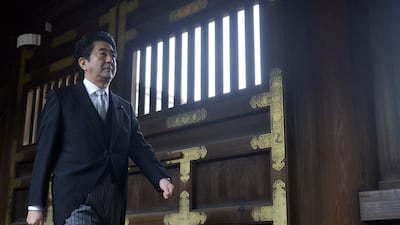TOKYO // Japan’s nationalist prime minister Shinzo Abe paid a visit to the Yasukuni war shrine on Thursday, prompting China to accuse Japan of whitewashing a history of warmongering and warn it must “bear the consequences”.
South Korea also blasted the “anachronistic” move, and Tokyo’s chief ally, the United States, said it was disappointed with an act that it would worsen tensions with Japan’s neighbours.
Mr Abe described his visit, which came days after he gave Japan’s military its second consecutive annual budget increase, as a pledge against war and said it was not aimed at hurting feelings in China or South Korea.
The Yasukuni Shrine honours about 2.5 million war dead, most of them common soldiers but also several high-level officials executed for war crimes after World War Two.
South Korea and China, both victims of Japan’s 20th-century aggression, see it as a symbol of Tokyo’s lack of repentance for the horrors of last century.
Mr Abe however said the purpose of his visit was to “to renew the pledge that Japan must never wage a war again”.
The visit came exactly a year after Mr Abe took office, a period in which he has formally met neither China’s president, Xi Jinping, nor South Korea’s president, Park Geun-hye.
Ties with Beijing were bad before Mr Abe took office, with the two countries contesting the ownership of uninhabited islands in the East China Sea.
The dispute has intensified this year, with the involvement of military aircraft and ships, leaving some observers warning of the danger of armed conflict.
Beijing wasted no time in slamming Mr Abe’s visit, which came on the day Mr Xi and other senior Chinese leaders visited the mausoleum of the late leader Mao Zedong to mark his 120th birth anniversary.
China summoned Tokyo’s ambassador and delivered a “strong protest and severe reprimand”, the foreign ministry said.
The Chinese foreign minister Wang Yi said the shrine visit was “a flagrant provocation against international justice”.
A foreign ministry official called the visit “absolutely unacceptable to the Chinese people” and cautioned Japan “must bear the consequences arising from this”.
The last incumbent Japanese prime minister to visit the shrine was Junichiro Koizumi in 2006. His repeated pilgrimages badly soured relations with China despite their economic and trade ties.
The foreign ministry in Tokyo said Mr Abe “visited Yasukuni Shrine in a purely personal capacity”.
But China and South Korea say no such distinction exists.
“The visit ... is anachronistic behaviour that fundamentally damages not only relations between the South and Japan but also stability and cooperation in Northeast Asia,” said the South Korean culture minister, Yoo Jin-ryong.
Washington must tread a careful line between supporting its chief regional ally in the face of China’s rise, and emboldening a prime minister many observers see as a hot-headed troublemaker. It offered qualified criticism.
“Japan is a valued ally and friend. Nevertheless, the United States is disappointed that Japan’s leadership has taken an action that will exacerbate tensions with Japan’s neighbours,” Washington said in a statement.
Agence France-Presse

